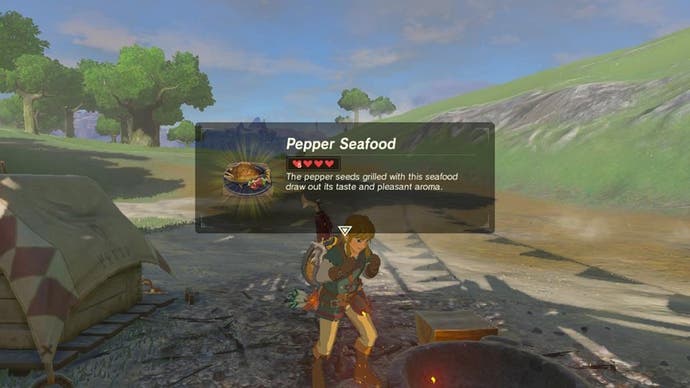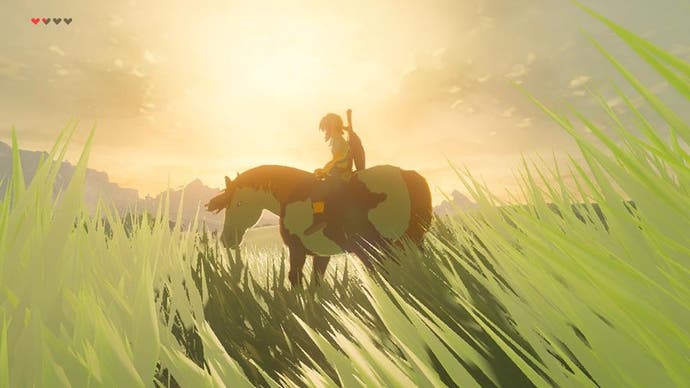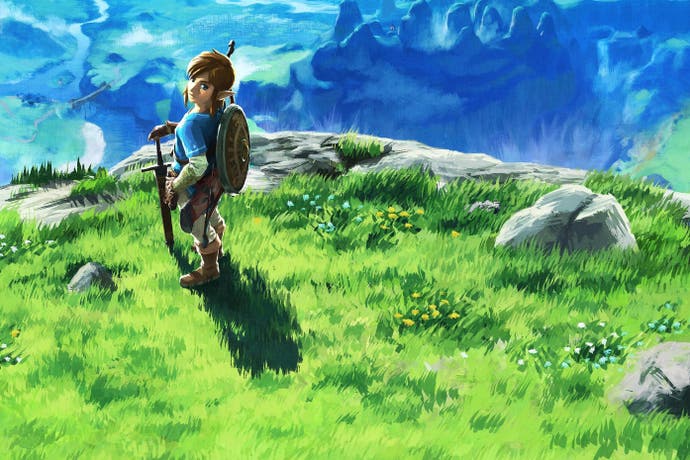Breath of the Wild is a Zelda game for the Minecraft generation
A breath of fresh air.
Do you remember your first adventures in Minecraft? I do. I was mostly confused. For much of its history, Minecraft hasn't done much to help you understand how to play it, how to craft things, what these crafted things do, and why you'd want them. It doesn't tell you about the alternate dimensions that you can visit, or about how you get to them. It doesn't tell you why should should play or what you're aiming for.
But for all that I was confused, I was also enchanted by the knowledge that the world stretched out in all directions around me, studded with hidden mineshafts, veins of gold and villages, and with forests and deserts, tundra and oceans, all waiting to be discovered. A world lay out there, just for me, if I could just survive the night.
And recently I've felt that same thrill, watching the camera in Breath of the Wild swoop behind Link as he exited the Shrine of Resurrection and follow as he reached the clifftop opposite to look out across all Hyrule.
When Oli reviewed Breath of the Wild he pointed something that's fundamental to its divergence from other Zelda games. "It's the first Nintendo game that feels like it was made in a world where Half-Life 2, Halo, Grand Theft Auto 3 and Skyrim happened," he said. And there's another game on which Breath of the Wild seems to have an eye: Minecraft.

Minecraft is a game about possibility, a space in which you play on your own terms. You can go anywhere, any time, and every triumph is yours, won through your skills, perseverance and smarts. These are ideas that lie underneath almost everything I love about Breath of the Wild so far, and they contrast pretty heavily with Nintendo's usual self. Starting most Nintendo games is often a grind of tutorials and tips that halt the action as they carefully teach you the key systems.
Remember Skyward Sword's intro? So many chats, so much story. There's Z-targeting to be learned, dashing and climbing, a stamina gauge to manage. When you're told it's time to fly your bird, the story kicks in and tells you it's lost, so you have to go tell a teacher to have a conversation with the headmaster about delaying a race - oh lord I'm boring myself - and all you want to do is go out and explore.
Nintendo's played the over-protective parent for years now, unable to allow you to feel confused or overwhelmed for a moment. But it's been particularly overbearing since the Wii era, when Nintendo welcomed new audiences to videogames and felt the need - probably rightly - to drum into them principles with which experienced gamers are absolutely familiar.
But in Breath of the Wild, it's suddenly hands-off. Take cooking. In making my way to one of the first shrines, I worked my way into the cold of the higher mountain, and suddenly found my health decreasing. Clearly, some kind of protection was necessary, and handily enough, Spicy Peppers were dotted around the slopes just below the snow.
So the solution had to be food, and finding that eating the peppers raw did nothing, I remembered that Breath of the Wild had some kind of cooking system. But I had no idea how to do it. There's no crafting screen, I'd found no cooking equipment. Facing the fact that I couldn't get to the next shrine, I turned back down the mountain to see if I could discover the secret.
I was confused about one of the game's fundamental systems, something that Zelda rarely allows you to be. Sure, I've been lost in Zelda innumerable times, unaware of where to go next or stumped by a puzzle, but the basic functions of those previous games had been drummed into me, sometimes by a pontifical owl. I could imagine Aonuma quivering with frustration if he was watching me play.
But Eiji, it didn't mean I wasn't enjoying myself. I wasn't about to switch my system off and sell my copy. Quite the opposite: I was setting out on my very own self-set quest, Learn Cooking, and on entering the Forest of Spirits I found the Old Man watching boars and ready to hint at the role of hunting in the game. Nearby was his camp, complete with an cooking pot and a campfire.
I found I could use a torch lit from the campfire to light the fire under the pot; I worked out that you have to 'hold' ingredients in the menu and then use them on the pot; I experimented with different combinations of ingredients and started to understand which worked together to make good food. And I made a recipe for food that would keep me warm for six minutes. That was my doing, not a result of being told, and it felt great.
This is precisely what Minecraft was like for me to play in the early days, when the pleasure in accomplishment came from the small things: the steady accrual of knowledge and experience through your own curiosity. And Breath of the Wild brought that feeling right back again.

Of course, Breath of the Wild isn't completely hands-off. There are tooltips and mini-tutorials about how to equip weapons, shields and other gear, and about the basics of using them. But, for Nintendo, they're incredibly unobtrusive. Most interactions are taught through careful and subtle juxtaposition: a boulder sitting at the top of a valley where two Bokoblins sit; the hot peppers by the path into the mountains.
The result is a wonderful sense of adventure and mystery. It feels like you're out alone in this vast land, with only your wits to help you, even though you're constantly guided by the invisible hands of Breath of the Wilds' designers. Hyrule is carefully laid out with encounters and puzzles, scenarios learned from three decades of Zelda dungeon design implicitly teaching the properties of its items, and there's a largely obvious critical path you can follow through the world (if you want to).
Minecraft is not this: you really are alone in a vast land, a generated one, and only its crafting system can guide you through it. It's also important to note that Breath of the Wild is capturing the sense of mystery and being a lone adventurer that Zelda has always striven for. Again, as Oli pointed out, the game that Breath of the Wild is most like is the original The Legend of Zelda.
But it's also looking to Minecraft, perhaps as a source of reassurance that this open approach can work for a wide audience. Minecraft re-blazed a trail for the principles of free-roaming adventure that The Legend of Zelda set all the way back in 1986. It reset a generation's expectations of what a game needs to teach them; gave them the freedom to explore all the lands around them and the game mechanics that govern them, helped them appreciate the delight in mystery and being confused. For Minecraft, all of these characteristics are a huge part of its enduring appeal. Perhaps they'll lead to a long, long life for Breath of the Wild, too.


